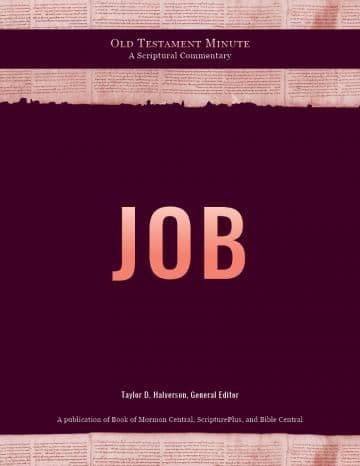Book
6 Chapters

Elihu continued his attempt to refute Job’s claims. Elihu took issue with Job’s assertion that “my righteousness is more than God’s” and with Job’s questioning of the use of righteousness: “What profit shall I have, if I be cleansed from sin?” (Job 35:2). Job felt that his righteousness had not saved him from pain and suffering and that his experience had told him that God “destroyeth the perfect and the wicked” (9:22). For Job, if righteousness did not prevent God’s destructive hand, then what was the profit in righteousness? This is an important issue in the book, and it takes us back to the conversation between Satan and God in Job 2, in which Satan accused Job of having a transactional relationship with God. We can paraphrase Satan’s question as “Does Job’s relationship with God come at no cost?” (see 1:9). Meaningful relationships come at a cost. Relationships with spouses and children require loving sacrifices of time and energy, and these loving sacrifices do not always have a quantifiable return. Did Job expect God to expend effort on their relationship and not the other way around? Elihu took issue with Job’s talk of profit, and this insightfully cuts to the heart of an important theme in Job. Elihu wanted Job to reflect on God’s own profit when it came to His reaction to human behavior. Elihu asked, “If thou sinnest, what does thou against him? . . . If thou be righteous, what givest thou him?” (verses 6–7). Elihu made the case that Job did not affect God by his behavior; Job’s behavior could only affect other humans: “Thy wickedness may hurt man as thou art; and thy righteousness may profit the son of man” (verse 8).
Elihu made an interesting argument. While there is truth to his words, there is also room to push back. In some ways, we can read Elihu’s argument like King Benjamin’s in Mosiah 2. King Benjamin argued that compared to what God does for us and the amount of work we require, we really are “unprofitable servants” (Mosiah 2:21). Not only are we unprofitable but we “cannot say that [we] are even as much as the dust of the earth” (Mosiah 2:25). When it comes to the cosmic economy of things, humanity does not provide God with any real benefit, and from that perspective we are unprofitable and “less than the dust of the earth” (Mosiah 4:2). However, King Benjamin’s words are not meant to drag us down, but rather they point to the real reason that God spends so much of His time serving us. He serves us and helps us not because we provide Him benefits but because He loves us. Our value comes because He loves us, not because we provide profit in the divine bank of heaven. This is analogous to small children in a family. They are not valuable because they put money in their parents’ pockets; they are valuable because their parents love them.
If we read Elihu’s words from King Benjamin’s perspective, they have merit. However, if our service to God gives Him no profit, what is the point of it? For King Benjamin, the answer is not because it’s good for us. We are not servers in some divine restaurant. Rather we are assisting God in His service of us, His children. God wants our help in His efforts to help the suffering of the helpless and to give hope to the discouraged. In other words, we seek to further His work and His glory through our inadequate efforts (Moses 1:39). In this sense, our righteousness and wickedness really do affect God, not because they add or take away from some cosmic bank account but because they bring joy to God—or they break His heart. We cannot use our unprofitable efforts to extort assurances that we will be spared struggles and suffering in life. As Enoch learned, God does not watch the wickedness of the world in an unaffected way; He weeps because of it (Moses 7). As Jesus taught us in Luke 15, righteousness demonstrated through repentance brings joy and rejoicing in heaven.
If Job was wondering what profit his relationship with God had given him, then maybe he had treated his relationship as too transactional. Perhaps he should have reflected on how much his relationship with God was worth. Was it worth all his suffering? By the end of the book, Job decided that it was worth this suffering. It was worth not knowing all the answers, and it was worth facing an uncertain future. Job decided that his relationship with God was far more than something that provided protection and security—it was a relationship that made all his sacrifices worth it.
Items in the BMC Archive are made publicly available for non-commercial, private use. Inclusion within the BMC Archive does not imply endorsement. Items do not represent the official views of The Church of Jesus Christ of Latter-day Saints or of Book of Mormon Central.